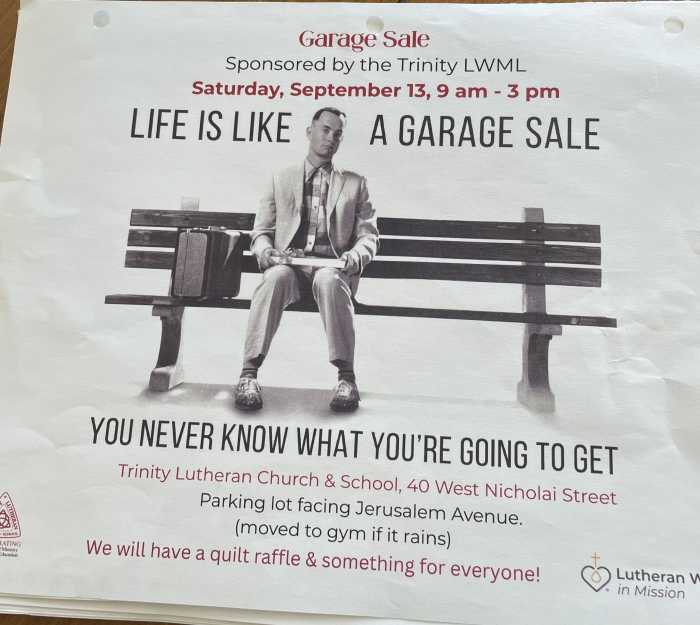Former U.S. Rep. George Santos has spent his first six weeks in prison comprehensively calling out the flaws of the country’s incarceration system.
The Ex-Nassau congressman was given an 87-month sentence in April after being convicted on charges of identity theft and wire fraud.
Since starting his sentence at the Federal Correctional Institution in Fairton, N.J., Santos has released a weekly message detailing his experience and the conditions of the prison, providing criticism of the country’s correctional system from the unique perspective of someone who previously participated in running it.
“I thought I’d seen government dysfunction before, but never at this level. What I’ve witnessed here is not just inefficiency, it’s outright chaos, sometimes bordering on what I can only describe as criminal negligence,” Santos wrote in a South Shore Press column. “This is not some cash-strapped government agency struggling to keep the lights on. No, this is the Bureau of Prisons, one of the most well-funded agencies in our federal government.”
“How do I know that? Simple. I worked on their budget back when I served in Congress,” he continued. “I peeled back the layers, studied the appropriations, and saw firsthand the resources Congress pours into this agency. With all that money at their disposal, there is absolutely no excuse for what I see every day here at Fairton…This isn’t an “oversight,” it’s a culture of neglect.”
He said his short time behind bars has shifted his perspective on incarcerated people and the system they find themselves in.
“The system isn’t built to rehabilitate — it’s engineered to break you down, to grind away at hope until all that’s left is compliance,” Santos said.
In a series of columns from behind bars, Santos reports a series of poor physical conditions: the bathroom as a “horror novel,” expired food, a building on the verge of falling apart, temperatures above 90 degrees Fahrenheit indoors, black mold within the walls and the entire facility as “hell on earth.”
More than just being uncomfortable, however, he said the poor conditions are dangerous to his and others’ physical and mental health and make him feel “dehumanized” and “undignified.”
“It’s not just the loss of freedom—it’s the erosion of your dignity. It’s realizing how many basic human rights we all take for granted on the outside,” his message reads. “A pillow that isn’t made of rubber. Soap that isn’t government-issued sandpaper. The freedom to choose when you eat or even what direction you walk in. Here everything is regulated, stripped down, dehumanized.”
“That’s been the hardest part. Not the routine, not the bed, not even the loss of freedom—but the slow disassociation from the man I once was,” he continued. “You start to forget what the world feels like when you’re not constantly being watched, measured or judged.
Describing prison life as a “surreal experience in detachment,” Santos’ letters detail serious health hazards and a lack of attention to them from prison guards, alleging that they violated the Fifth Amendment, which forbids cruel and unusual punishment.
“On my first night, I discovered a gaping tear in the vinyl ceiling six feet long and four feet wide, exposing thick black mold overhead,” Santos wrote. He said that after raising the alarm about the mold and increased difficulty breathing for weeks, a maintenance officer simply covered it up instead of properly repairing it.
He also wrote that temperatures inside the prison frequently hovered between 85 and 90 degrees Fahrenheit in the thick of summer.
“The heat doesn’t go away. The mold doesn’t disappear. And the toll on our health keeps mounting. Breathing becomes a daily struggle,” Santos states. “Sleep, once a refuge, is now a luxury. On most nights, I scrape together four, maybe five restless hours before the suffocating air jolts me awake.”
“Now, I may be an inmate, but I am also an American. Every man in here is still entitled to basic rights and basic dignity,” he continues. “To ignore those rights in the name of bureaucratic incompetence is nothing short of unconstitutional.”
He said when he has asked for improvements or for issues to be resolved, he has been met with mockery or “excuses” that “don’t hold water,” considering that he “knows the budget” of the incarceration system.
However, he said he believes his continued columns have resulted in the installation of an air conditioner at the facility, though no other changes have been made.
Santos isn’t alone in the conditions he’s experiencing and as he notes in his letters, he is at one of the country’s least harsh facilities. He is one of roughly 2 million people in the United States who are currently incarcerated, according to the Prison Policy Initiative.
“No one on the outside ever thinks about what these places look like, let alone who’s inside. After all, we’re the “scum,” right? Society writes us off, labels us, forgets us,” Santos’ letter reads.
The United States puts more people behind bars per capita than any other independent democratic country.
Santos said his intent with his writing is to prevent himself and fellow inmates from being forgotten and to shine a light on “undignified” prison conditions experienced by so many.
“I’m not going to be silent about the way dignity is quietly stripped from the incarcerated,” he writes. “I will not allow my fellow inmates—or myself—to forget that we are still human beings, still Americans, and still protected under [the Constitution].”
“This is prison. It’s not meant to be comfortable. Nobody here is asking for luxury. But there is a world of difference between comfort and dignity, and the latter is not optional,” Santos wrote. “It’s mandatory. Dignity is the bedrock of justice. It’s what separates a civilized society from a punitive circus.”
“I write this now not to ask for sympathy—but to share the raw truth of what this place is. What it does. And what I’ve come to understand about myself, my country, and the system we live under,” Santos ends one of his testimonials. “Because if there’s one thing prison has taught me—it’s that even behind these walls, your voice still matters. And mine isn’t going anywhere.”



































